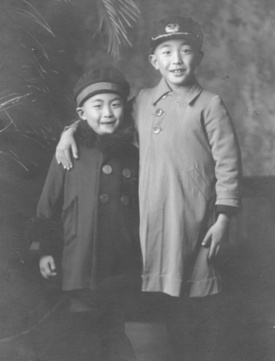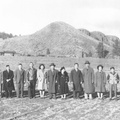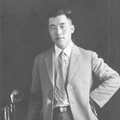Meanwhile in Japan
When war came, the first thing the Japanese government did was freeze all assets. Overnight Mom couldn’t get money, our rich lifestyle had to be shut down and the next few years were a life of poverty for Kanshiro Koyama’s family in Japan.
Mom closed down the gorgeous two-story house by the moat of Wakayama Castle and we moved to live with her older sister, the wife of a professor who taught at a Women’s College in Nagoya. In 1942 everything was as normal as could be expected until Doolittle's first air raid over the Japanese mainland dropped bombs over Tokyo and Nagoya. We lived within hearing distance of the explosions. The explosions were so loud that I thought they would burst my eardrums. Soon after we had to decide to move back into much smaller cities like Wakayama, less likely to be targets.
Mom had to report to the kenpei [the military police] and file a family registry disclosing my Dad’s addresses in Canada. Wherever we moved we were looked at as enemy aliens. I was picked on by my peers throughout the war. I had to change grade schools 11 times and I have scars to show for it. I had been brought up by Mom without any man's strong discipline so I got away with murder. She did all she could to discipline me. I used to get in so many fights and poor Mom had to appear and apologize to school authorities.
I remember that in those earlier years of war, you would see me wearing all the clothing and shoes and rain boots made in America, different looking than the domestic make. Discriminatory actions against us were harsh. I hated whenever it rained; I had to wear American-made rain boots. Even after one stray bomb fell on a part of our town, people pointed fingers at us the following day saying that they “saw us using flashlights towards the sky.”
Towards the end of the war, when formations of B-29 bombers flew over Wakayama, I used to lie flat on my back on our outdoor veranda and look up at them on their run into Osaka and they were a sight to behold: beautiful silver reflections, with beautiful vapor trails.
One month before the end of the war, the night started like any other night. Air Raid sirens were blaring in the distance and we thought the bombers had returned to finish what they had begun at Osaka a week earlier.
No. This was different from any others. Suddenly from the western part of Wakayama City the night sky turned a bright red. My brother and I looked at each other and started running towards the eastern part of the city without even telling our mother what we were going to do. I had put my shoes on but my older brother had only a pair of thongs.
I felt so full of guilt for not telling Mom and our grandmother that we were running away to save our skin and not even trying to help those two frail women to avoid the bombing.
We ran and ran, throughout most of the night, until we were out of the city proper and we reached one of the farmhouses on the outskirts, and an old woman extended her hand out to give my brother and me onigiri rice balls.
It was so good to see the first light of the new day. Then we needed to head back into the city from where we just escaped. And we were not sure what we were going to find on our return trip. The most pressing concern was whether we would be able to find our Mom and Grandma alive.
Anyone who finds themselves in extreme circumstances being pushed to a life or death situation could become a super Wonder Woman. My mother who is tall (5’8”) and slender became such an extraordinary woman. That night in Wakayama when she was in an inferno and realized that her sons had run away and she and her mom had to get out of the city, she decided to dump a couple of trunks packed with clothing into our well. It must have weighed a lot. She managed to drag those trunks and threw them down the well. How did she ever have the presence of mind to do that before leaving the house while it burned?
By the time she was ready to leave, flames were already on neighboring houses. Smoke was so thick she said she couldn’t make out which direction to escape.
I am going to tell you about my mother and her being endowed with extraordinary spiritual power she had in those days. She was a “Shirley MacLaine” type of spiritual intermediary. People would come to her and tell her they would like to talk to one of dead ancestors or siblings. Soon after special prayers and chants, my mother’s body was taken over by the dead person's spirit and voices. I witnessed many of these events and was frightened each time whether she would be able to come back to a normal mother.
That was my mother. By the time she hit the street with her own frail mother by her side, she vociferously demanded or commanded her god to show her the way, and lo and behold, wind from the fireballs parted a path for her. That’s the power of faith in extraordinary circumstances. Mom and Grandma made it alive. Now our house was burnt and how were we going to survive?
Anywhere we went there were dead bodies. Blackened bodies. We looked down at the moat. The place we used to call “our playground” was full of bodies. People had jumped in to try save themselves from the intense heat of incendiary bombs. I also saw one of my friends burnt black with his scalp split open. How did I know he was one of my friends? He was a newspaper boy who carried a bell on his left side, and the bell was there by his body. All of this was too obscene for a kid my age to witness the horrors of war.
First thing we did was to try to get back to our burnt down house and retrieve the trunks full of wet clothing from the well. We had to drench ourselves with water to keep us cool from the intense heat. We put everything on a burnt pushcart with no tires and just the burnt metal wheels and my brother and I pushed it across the whole city until we reached our friends' inn in Wakayama Bay.
When we reached our friends' inn, it was full of burnt victims and the most hideous smell of burnt human flesh. I cannot get that smell out of my senses even after 75 years.
We could not stay there any longer than a few days, so we decided to move to Kanshiro Koyama's parents' house in Mio-mura. It was a whole day's trip from Wakayama Bay by train. This is my Dad’s village where he grew up, and most of the people were related.
Many old photographs were destroyed in our house during the Wakayama fire bombing. One photograph that I remember vividly and was very fond of was a picture of my Dad and his dog on his boat in Silva Bay. I wish I still had this picture to share.
August 6, 1945
Then a new big bomb was dropped on Hiroshima. We didn’t know what it was. The newspaper reported a new type of bomb. Next morning in Mio-mura, approximately 155 miles from Hiroshima, we were showered with ash. It was as thick as 4” on every roof and plants and trees all over.
Soon after that the war was over. After Hiroshima, that’s the knockout punch. Why then Nagasaki? The most Christian city in all of Japan? They incinerated almost a quarter million people between the two cities.
*This article, written by Daniel “Yosh” Koyama with Timothy Koyama and Phyllis Reeve, was originally published in the Nikkei Images, Vol 26, No. 1.
© 2021 Daniel "Yosh" Koyama







